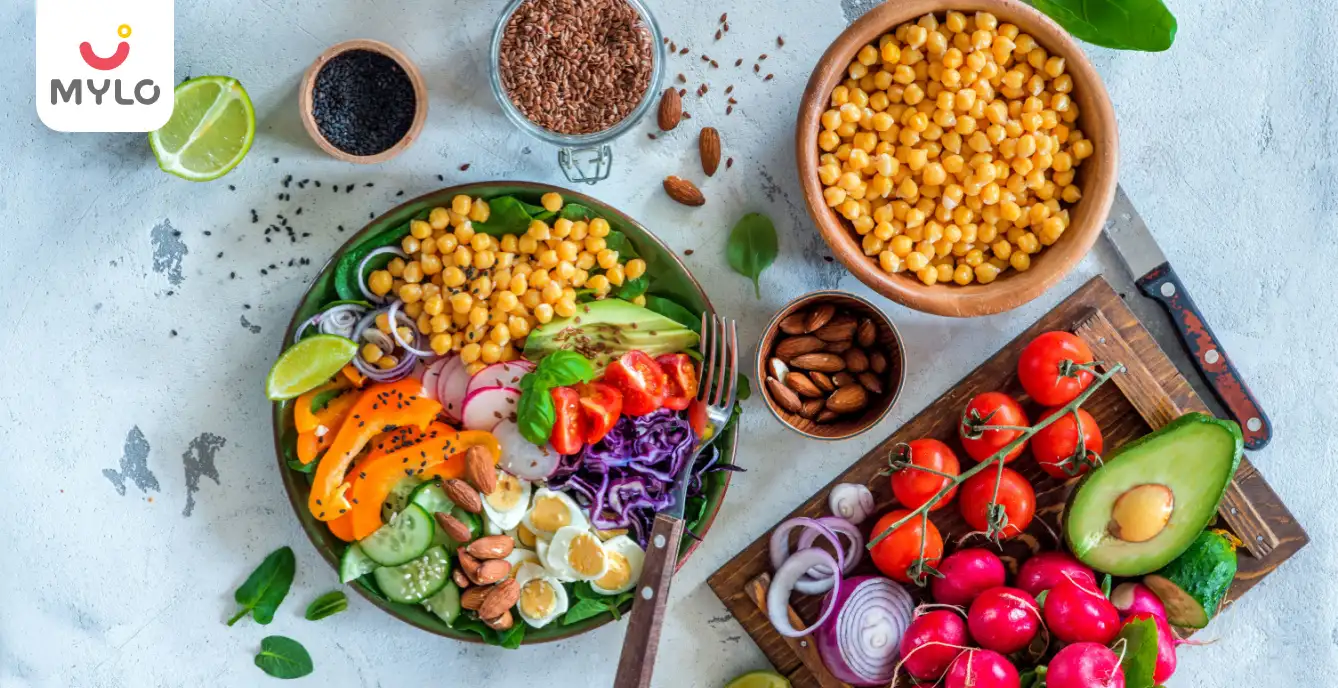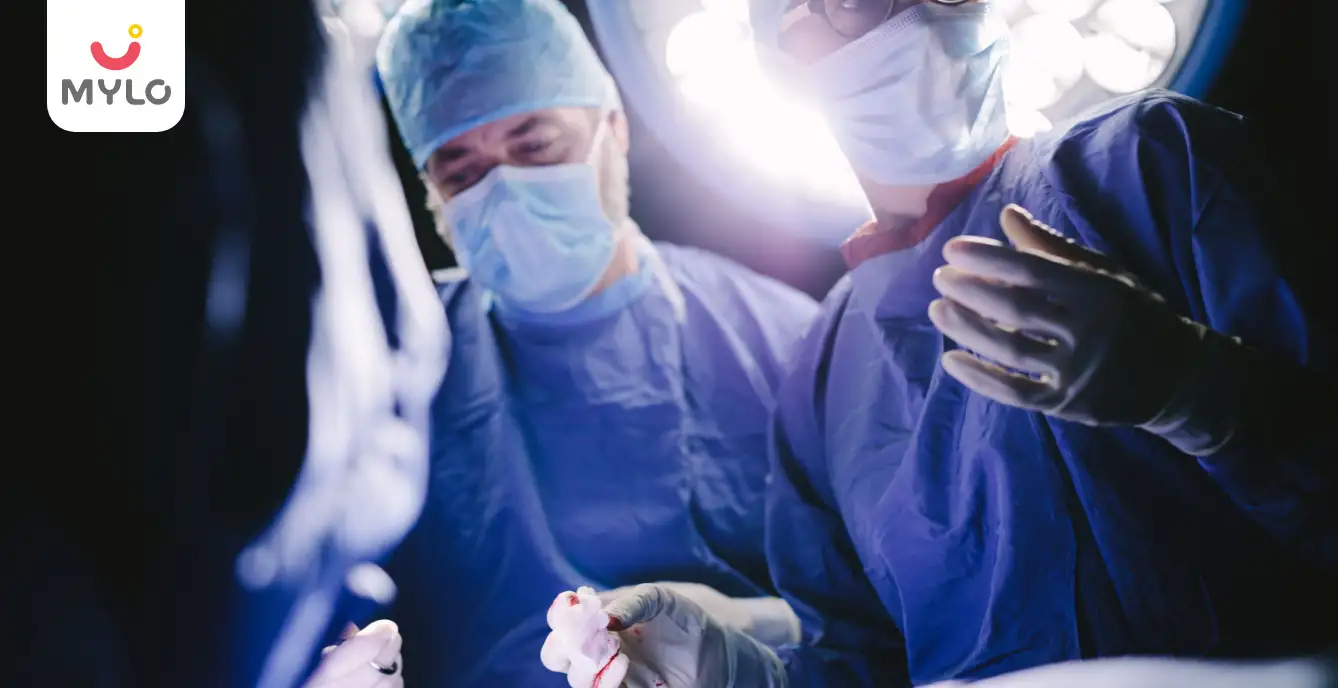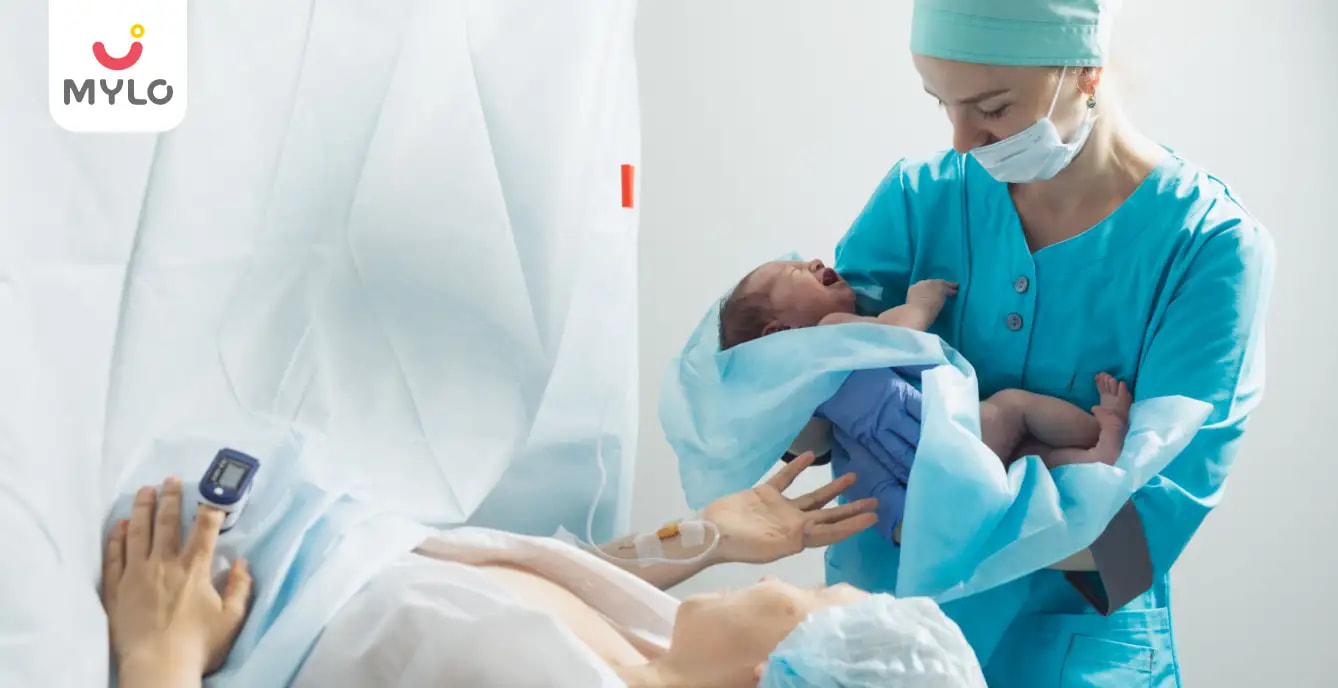Get MYLO APP
Install Mylo app Now and unlock new features
💰 Extra 20% OFF on 1st purchase
🥗 Get Diet Chart for your little one
📈 Track your baby’s growth
👩⚕️ Get daily tips

OR


Article Continues below advertisement
- Home

- In Vitro Fertilization (IVF)

- IVF Baby Delivery: Will You Have a C Section or Vaginal Delivery?
In this Article
- How is IVF Pregnancy Different from a Natural Pregnancy?
- 1. Conception Process
- 2. Fertility Treatment
- 3. Control over Timing
- 4. Multiple Pregnancy
- 5. Monitoring and Medical Intervention
- Is it Possible to Have Normal Delivery in IVF?
- When is C section Recommended in an IVF Delivery?
- 1. Maternal Health Conditions
- 2. Fetal Position
- 3. Placenta Previa
- 4. Multiple Pregnancy
- 5. Previous C-section
- How to Prepare for IVF Baby Delivery?
- 1. Prenatal Care
- 2. Attend Childbirth Education Classes
- 3. Create a Birth Plan
- 4. Prepare for Pain Management
- 5. Pack a Hospital Bag
- 6. Emotional Support
- FAQs
- 1. How are IVF Babies Delivered?
- 2. Are IVF Babies Born Early or Late?
- 3. Can You Give Birth Naturally After IVF?
- The Bottomline
In Vitro Fertilization (IVF)
 320
320IVF Baby Delivery: Will You Have a C Section or Vaginal Delivery?
Updated on 19 July 2023
Deepika was going through a profound emotional upheaval following the IVF procedure. She now gets anxious about little things and constantly worries about the baby. Her Google search was filled with questions like IVF baby delivery and is it possible to have normal delivery in IVF. This article discusses all the essential aspects around the topic to help expecting ladies like Deepika who have endured significant trials and tribulations.
How is IVF Pregnancy Different from a Natural Pregnancy?
IVF and natural pregnancy differ in several aspects, primarily due to the assisted reproductive techniques involved in IVF. Here are some key differences between the two:
1. Conception Process
In a natural pregnancy, conception occurs when sperm fertilizes an egg inside the woman's body, typically in the fallopian tube. In IVF, conception occurs outside the body, in a laboratory setting, where eggs are retrieved from the woman's ovaries and fertilized with sperm in a controlled environment. The resulting embryos are then transferred to the woman's uterus.
Article continues below advertisment
2. Fertility Treatment
IVF is a fertility treatment option for individuals or couples facing infertility. Natural pregnancy, on the other hand, occurs without any medical intervention.
3. Control over Timing
With IVF, the timing of conception is controlled and planned, while in natural pregnancy, timing is not within an individual's control, as it depends on ovulation and the timing of sexual intercourse.
4. Multiple Pregnancy
IVF carries a higher risk of multiple pregnancies compared to natural conception. This is because multiple embryos are often transferred to increase the chances of successful implantation. In a natural pregnancy, the likelihood of conceiving multiples is typically lower.
5. Monitoring and Medical Intervention
IVF pregnancies require close monitoring through frequent ultrasounds and blood tests to assess the growth and development of the embryos. In a natural pregnancy, monitoring is typically less intensive unless specific medical concerns exist.
Is it Possible to Have Normal Delivery in IVF?
The answer to the question in IVF is there any chances of normal delivery is yes. It is possible to have a normal delivery (vaginal birth) following an IVF baby delivery. The method of conception, whether through IVF or natural means, does not necessarily determine the mode of delivery. The decision on the way of delivery, whether it's a normal vaginal birth or a cesarean section (C-section), depends on various factors that healthcare professionals assess during pregnancy.
Article continues below advertisment
Factors that influence the mode of delivery include:
-
Maternal health
-
Fetal position and size
-
Obstetric factors such as the presence of placenta previa
-
Previous delivery history
Article continues below advertisment
It's recommended to discuss any questions or concerns regarding the mode of delivery with the healthcare provider or obstetrician, who can provide personalized guidance based on the individual's unique situation.
When is C section Recommended in an IVF Delivery?
The decision to recommend a cesarean section (C-section) in an IVF pregnancy, similar to any pregnancy, is based on several factors assessed by healthcare professionals. While the goal is typically to achieve a vaginal birth, there are circumstances where a C-section may be recommended for the safety of both the mother and the baby.
Here are some situations in which a C-section may be considered in an IVF delivery:
1. Maternal Health Conditions
Conditions like heart disease, high blood pressure, preeclampsia, or certain infections could be worsened by the stress of labor.
2. Fetal Position
A C-section may be recommended as the safest option if the baby is in a breech position (buttocks or feet first) or in a transverse position (sideways).
Article continues below advertisment
3. Placenta Previa
Placenta previa is a condition where the placenta covers part or all of the cervix, obstructing the baby's passage through the birth canal. A C-section is usually recommended to avoid potential complications, such as bleeding during labor.
4. Multiple Pregnancy
In IVF pregnancies with multiples (twins, triplets, etc.), the healthcare provider may opt for a planned C-section if certain conditions arise.
5. Previous C-section
If a woman has had a prior C-section, the decision for subsequent deliveries will depend on factors such as the type of uterine incision from the previous surgery, the reason for the last C-section, and the presence of any contraindications for a vaginal birth after cesarean (VBAC).
You may also like : Top 5 Precautions You Should Take After Getting an IVF Treatment
How to Prepare for IVF Baby Delivery?
Preparing for the delivery of an IVF baby is similar to preparing for a baby conceived naturally. Here are some steps to help you prepare for an IVF delivery:
Article continues below advertisment
1. Prenatal Care
Attend regular prenatal check-ups with your healthcare provider. These appointments are essential for monitoring your pregnancy's progress, assessing your and your baby's health, and addressing any concerns or complications that may arise.
2. Attend Childbirth Education Classes
Consider enrolling in childbirth education classes, such as Lamaze or prenatal classes offered by hospitals or birthing centers. These classes provide valuable information about the labor and delivery process, pain management techniques, relaxation exercises, and breathing techniques to help you feel more prepared and confident during labor.
3. Create a Birth Plan
Collaborate with your healthcare provider to create a birth plan outlining your labor and delivery preferences.
4. Prepare for Pain Management
Explore different pain management techniques and discuss your options with your healthcare provider. This may include natural pain relief methods such as breathing exercises, massage, hydrotherapy, or medical interventions such as epidural anesthesia.
5. Pack a Hospital Bag
As your due date approaches, prepare a hospital bag with essentials for you and your baby. Include comfortable clothing, toiletries, nursing bras, maternity pads, snacks, and items for your baby, such as clothing, blankets, and diapers.
Article continues below advertisment
6. Emotional Support
Seek emotional support from your partner, family, and friends throughout the delivery process.
FAQs
1. How are IVF Babies Delivered?
IVF babies are typically delivered through the same methods as babies conceived naturally. The most common forms of delivery include vaginal birth and cesarean section (C-section), depending on factors such as maternal health, fetal position, and obstetric considerations.
2. Are IVF Babies Born Early or Late?
IVF babies are not inherently predisposed to being born either early or late. The gestational age at which an IVF baby is born is influenced by factors such as the mother's health, the progress of the pregnancy, and any specific medical indications.
3. Can You Give Birth Naturally After IVF?
Yes, giving birth naturally (vaginal birth) after undergoing IVF is possible. The mode of delivery, whether vaginal or cesarean section, is determined based on individual circumstances such as maternal health, fetal position, and obstetric considerations.
The Bottomline
In conclusion, it is essential to recognize that IVF baby delivery can vary based on individual circumstances. While IVF does not dictate the need for a cesarean section, factors such as maternal health, fetal position, and obstetric considerations play a significant role in determining the mode of delivery. The ultimate goal is to ensure the mother's and baby's safety and well-being. Therefore, discussions with healthcare providers and personalized assessments are crucial in making informed decisions regarding the mode of delivery after IVF.
Article continues below advertisment
References
1. Choe, J., Archer, J. S., & Shanks, A. L. (2020). In Vitro Fertilization. PubMed; StatPearls Publishing.
2. Kathpalia, S. K., Kapoor, K., & Sharma, A. (2016). Complications in pregnancies after in vitro fertilization and embryo transfer. Medical Journal Armed Forces India



Written by
Madhavi Gupta
Dr. Madhavi Gupta is an accomplished Ayurvedic doctor specializing in Medical content writing with an experience of over 10 years.
Read MoreGet baby's diet chart, and growth tips

Related Articles
Understanding RSV And Its Long-Term Impact On Lung Health In Preterm Infants
Preventing Respiratory Syncytial Virus (RSV) In Preemies: Essential Steps For New Parents
How Respiratory Syncytial Virus (RSV) Impacts Premature Babies Differently: What Every Parent Needs To Know
Adverbs: A Comprehensive Guide to help small children learn the usage of adverbs
Related Questions
Influenza and boostrix injection kisiko laga hai kya 8 month pregnancy me and q lagta hai ye plz reply me
766 views
Hai.... My last period was in feb 24. I tested in 40 th day morning 3:30 .. That is faint line .. I conculed mylo thz app also.... And I asked tha dr wait for 3 to 5 days ... Im also waiting ... Then I test today 4:15 test is sooooo faint ... And I feel in ma body no pregnancy symptoms. What can I do .
758 views
Baby kicks KB Marta hai Plz tell mi
757 views
PCOD kya hota hai
1316 views
How to detect pcos
64 views
RECENTLY PUBLISHED ARTICLES
our most recent articles

In Vitro Fertilization (IVF)
How Many Injections for IVF Treatment Do You Really Need
(123 Views)

Conception
IUI Failure Symptoms & Reasons: Understanding Why IUI Fails & What to Do Next
(1,513 Views)

Breastfeeding & Lactation
Fever During Breastfeeding: Tips from Experts for New Moms
(5,544 Views)

Diet & Nutrition for Mothers
Indian Food to Increase Breast Milk: Everything You Need to Know
(7,956 Views)

Lactose Intolerance
Lactose Intolerance in Babies: A Parent’s Guide to Identifying and Managing it
(125 Views)

Medical Procedures
TESA IVF: How This Procedure Can Help You Achieve Your Dream of Parenthood
(123 Views)
- How Can You Encourage Sensory Play for Your Baby and What are Its Benefits?
- After How Many Weeks IVF Pregnancy Is Safe: Understanding The Ideal Timeline
- Exploring the Senses: 9 Incredible Benefits of Sensory Play for Your Child's Development
- The Ultimate Guide to Childproofing Your Home
- Start Their Love for Reading Early: The Best Books for Baby's First Library
- CMPA (Cow's Milk Protein Allergy): Identifying Symptoms and Understanding Treatment
- Birth Control Options While Breastfeeding: Balancing Parenthood and Contraception
- Period During Breastfeeding What Every New Mother Should Know
- Role of Stories and Rhymes in Your Baby’s Brain Development
- Intracytoplasmic Sperm Injection (ICSI) How It Can Help Treat Male Infertility
- Baby Sleeping While Breastfeeding: Understanding the Causes and Solutions
- Lump in Breast During Breastfeeding How to Identify, Treat, and Prevent Lump Formation
- Understanding Down Syndrome: A Comprehensive Guide for Parents
- No Breast Milk After Delivery: What to Do & What are the Factors Responsible


AWARDS AND RECOGNITION
Mylo wins Forbes D2C Disruptor award
Mylo wins The Economic Times Promising Brands 2022
AS SEEN IN
















At Mylo, we help young parents raise happy and healthy families with our innovative new-age solutions:
- Mylo Care: Effective and science-backed personal care and wellness solutions for a joyful you.
- Mylo Baby: Science-backed, gentle and effective personal care & hygiene range for your little one.
- Mylo Community: Trusted and empathetic community of 10mn+ parents and experts.
Product Categories
baby carrier | baby soap | baby wipes | stretch marks cream | baby cream | baby shampoo | baby massage oil | baby hair oil | stretch marks oil | baby body wash | baby powder | baby lotion | diaper rash cream | newborn diapers | teether | baby kajal | baby diapers | cloth diapers |








